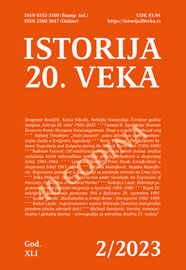OD RELATIVIZACIJE DO NEGIRANJA RATNIH ZLOČINA: ANALIZA SASLUŠANJA BIVŠIH RUKOVODILACA NEMAČKE POLICIJE BEZBEDNOSTI U OKUPIRANOJ SRBIJI 1941–1944.
FROM RELATIVIZATION TO DENIAL OF WAR CRIMES: ANALYSIS OF INTERROGATIONS OF FORMER LEADERS OF THE GERMAN SECURITY POLICE IN OCCUPIED SERBIA 1941-1944
Author(s): Radosav TucovićSubject(s): History, Special Historiographies:, Fascism, Nazism and WW II
Published by: Institut za savremenu istoriju, Beograd
Keywords: Third Reich; Nazi Germany; Occupied Serbia; Security Police; Gestapo; War Crimes; Trial; Wilhelm Fuchs; August Meyszner; Emanuel Schäfer
Summary/Abstract: The article analyzes the statements expressed by the leaders of the German Security Police in Occupied Serbia regarding their actions and war crimes. Dr. Wilhelm Fuchs, Commander of the Einsatz Group for Yugoslavia (1941), then August Meyszner, Senior SS and police leader in Serbia (1942- 1944), and Dr. Emanuel Schäfer, Commander of the Police and Security Service in Serbia (1942-1944), were selected for analysis. The introductory part presents the contextualization of international legislation, which was in force during the Second World War. The development of the German Security Police in occupied Serbia was explained, to understand the positions of Fuchs, Meyszner and Schäfer. In the central part, the article specifically analyzes the phenomenon of crime denial. The analysis of their statements is divided by phenomena - command or personal responsibility, management of camps, abuse of prisoners and reprisals. At the very end, a brief comparison is offered with the statements expressed at the Nuremberg trial by Ernest Kaltenbrunner, a key figure of the Security Police from 1943 to 1945. So, the results of this analysis present an overview of the transfer of mostly shared responsibility. The review offers a look at how they often shifted responsibility to each other, or often denied it without any significant grounds. All of this is complemented by the results of official historiography, as well as a summary of Kaltenbrunner’s defense, which confirms that it was a kind of framework of denial of responsibility after the Second World War.
Journal: Istorija 20. veka
- Issue Year: 2023
- Issue No: 2
- Page Range: 345-360
- Page Count: 16
- Language: Serbian

